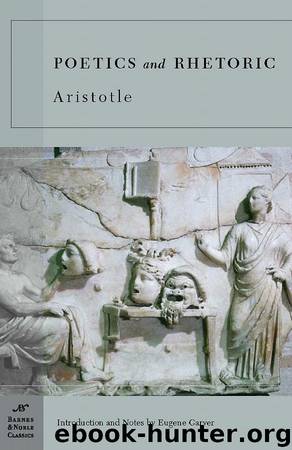Poetics and Rhetoric by Aristotle

Author:Aristotle
Language: eng
Format: epub
Publisher: Barnes & Noble Classics
Published: 2009-05-31T16:00:00+00:00
-11-
The chapters begins with a definition of pleasure,. In order to supply propositions, about pleasure., Aristotle shows its connections to other mental conditions, especially desire and imagination. The rest of the chapters then discusses what things are pleasant.
1369b33. PLEASURE IS A MOVEMENT... PAIN IS THE OPPOSITE: Readers of the Rhetoric often have to decide for themselves when Aristotle is saying what he really thinks and when he is presenting the common beliefs of people who need to be persuaded. This statement is a perfect example. Is this a scientific definition of pleasure or a statement of common opinion about it? Which of those understandings of pleasure does the speaker need in order to be persuasive ? The case is difficult. The definitions of the different emotions in book II have to be true for the orator’s manipulation of audiences to work-that is, he must actually know what the emotions are in order to use them. But the list of seven causes of action in chapter 10 seems a loose and unscientific classification, because any more precision would not help the orator. The same holds for the distinction of rational and irrational desires later in this paragraph. It is hard to see this definition of pleasure as either true or helpful.
anger are due all acts of revenge. Revenge and punishment are different things. Punishment is inflicted for the sake of the person punished; revenge for that of the punisher, to satisfy his feelings. (What anger is will be made clear when we come to discuss the emotions.) Appetite is the cause of all actions that appear pleasant. Habit, whether acquired by mere familiarity or by effort, belongs to the class of pleasant things, for there are many actions not naturally pleasant which men perform with pleasure, once they have become used to them. To sum up then, all actions due to ourselves either are or seem to be either good or pleasant. Moreover, as all actions due to ourselves are done voluntarily and actions not due to ourselves are done involuntarily, it follows that all voluntary actions must either be or seem to be either good or pleasant; for I reckon among goods escape from evils or apparent evils and the exchange of a greater evil for a less (since these things are in a sense positively desirable), and likewise I count among pleasures escape from painful or apparently painful things and the exchange of a greater pain for a less. We must ascertain, then, the number and nature of the things that are useful and pleasant. The useful has been previously examined in connexion with political oratory; let us now proceed to examine the pleasant. Our various definitions must be regarded as adequate, even if they are not exact, provided they are clear.
Download
This site does not store any files on its server. We only index and link to content provided by other sites. Please contact the content providers to delete copyright contents if any and email us, we'll remove relevant links or contents immediately.
Cecilia; Or, Memoirs of an Heiress — Volume 1 by Fanny Burney(31360)
Cecilia; Or, Memoirs of an Heiress — Volume 3 by Fanny Burney(30958)
Cecilia; Or, Memoirs of an Heiress — Volume 2 by Fanny Burney(30914)
The Lost Art of Listening by Michael P. Nichols(6496)
We Need to Talk by Celeste Headlee(4892)
Asking the Right Questions: A Guide to Critical Thinking by M. Neil Browne & Stuart M. Keeley(4612)
On Writing A Memoir of the Craft by Stephen King(4233)
Dialogue by Robert McKee(3600)
I Have Something to Say: Mastering the Art of Public Speaking in an Age of Disconnection by John Bowe(3526)
Pre-Suasion: A Revolutionary Way to Influence and Persuade by Robert Cialdini(3433)
Elements of Style 2017 by Richard De A'Morelli(2949)
The Book of Human Emotions by Tiffany Watt Smith(2783)
Good Humor, Bad Taste: A Sociology of the Joke by Kuipers Giselinde(2564)
Name Book, The: Over 10,000 Names--Their Meanings, Origins, and Spiritual Significance by Astoria Dorothy(2501)
Fluent Forever: How to Learn Any Language Fast and Never Forget It by Gabriel Wyner(2461)
The Grammaring Guide to English Grammar with Exercises by Péter Simon(2403)
Why I Write by George Orwell(2371)
The Art Of Deception by Kevin Mitnick(2309)
Don't Sleep, There Are Snakes by Daniel L. Everett(2225)
